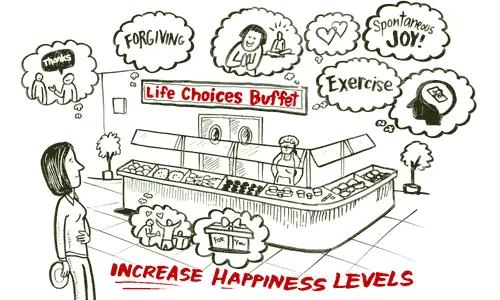What Good Is Health Without Happiness?:
In this video, our old friend Dr. Mike Evans tackles one of the most important results & goals of good health.
What good is a robust physical health if your Mind isn’t along for the party, right?
Well, Dr. Mike goes on to sketch out several of the Sources, Variables, and Misconceptions in this video,
-And most important of-all: What you can Actually Do to improve it!…
So Happiness in-general is an odd and very counter-intuitive subject.
Science Cooks Up The Basics Despite Contradictions:
In some strange Hawthorne-Effect ways, the more we try to come up with an explicit formula, the farther away we might get.
And each one of us might hold wildly-different meanings or definitions.
Even for the simplest Types of happiness such as:
1) Basic Pleasure
2) Being Actively-Engaged in our Circumstances
3) Goal-Achievement/Life Satisfaction.
Well, the medical world defines this all abstractly as, “Subjective Well-Being”.
From Simple Types To Each Facet Of Life:
At least those basic types of subjective well-being can be tied-to or greatly derived from the general categories of activity in a person’s life.
These buckets include but are not limited to:
1) Intrapersonal Contentment
2) Family
3) Friends
4) Work
5) Control Over Circumstances
6) Spirituality
And the content of those silos with each ratio adding up to happy is really a calculus left up to each individual.
-Especially for computing Happiness’s older & wiser sibling: Meaning.
However, the scientific study of it does come with some useful lessons.
And the big ones are outlined by Dr. Sonja Lyubomirsky from U.Cal-Riverside:
The Big 3 Factors That Predict Happiness:
1) Genes (like the Inheritable part of Temperament & Personality)
2) Life Circumstances (like Psychology of one’s Early-Surroundings, Wealth, Location of Home, and Health)
3) Life Choices & Behaviors
And the $64,000 Question: Which of these is most important/influential?
Dr. Sonja says the results of her studies show the makeup of influence is:
1) 50% Genes
2) 10% Life Circumstances
3) 40% Life Choices/Behaviors
Even though Dr. Sonja is one of the foremost experts on Happiness not currently named “Lama”, there are some very-important distinctions to be drawn though.
An Early Word On Contradictions & The Dangers Of “Simple Math”:
1) For example, the difference made by getting someone out of poverty into a more economically-stable life will give a meaningful & lasting bump in happiness.
2) But for other things like: New Car, New House, Higher Salary, New Lover, for someone who already has a +/- solid foundation, it may not be true.
2a) There’s actually a Princeton study out that says salary-increases past $75,000 a year have not been shown to increase happiness.
(no word on how many billionaire-CEOs they surveyed, though)
2b) The items in 2) like material-purchases Do give a boost, But their effects actually wear-off over a certain window of time.
2c) -And then you go back to your previous average happiness set-point.
2d) For a car that interval might be 2-3 months. For a marriage it could be as little as 2 years.
3) This retracement is called: Hedonic Adaptation.
Gratitude & Mindfulness Do The Opposite Of Hedonism:
4) Conversely, there is a lot to be said for the opposite. -Not getting something we want but don’t have, but instead recognizing & appreciating what we Do have. -ie: The Gratitude Movement.
5) Also from Gratitude, easily flows the Mindfulness route. Ie: Turning Gratitude from an Event into a State, where you extract the most you can from the present. -And also doing this well-before, or even in-place-of turning one’s mind to the future.
5a) This can be an entire undertaking or discipline in itself. Especially because mindfulness meditation is simple in concept, but hard in execution.
And from something as concentrated & deliberate as Gratitude & Mindfulness-State-ifying comes the Second Big Lesson:
The Part Of Your Happiness You Can Actually Change. -Life Choices:
These may not be -perfectly- within our grasp 100% of the time, but they are Mostly in our control.
And many of them may feed-back into other areas of choice, creating synergies that were not always foreseeable.
These areas of active involvement include, but are not limited to:
1) Expressing Gratitude
2) Being More Forgiving
3) Being More Mindful
3a) Learning to Identify & Reproduce the “Flow” State (where you’re fully-immersed in a positive task/work/activity)
4) Meditation, or even Prayer
5) Physical Exercise
6) Investment in High-Quality Social Relationships
7) Altruism, Kindness, Compassion, Charity, Doing Things For Others
8) Minimizing/Controlling/Elminating Limiting-Beliefs and Cognitive-Distortions that make us feel irrationally bad about ourselves.
Every one of these together or individually can work & increase your happiness regardless of where the other 2 big variables of 1)Genes and 2)Life-Circumstance are at.
One Example Of The Big 8, The Benefits Of High-Quality Relationships:
It was called the Grant & Glueck Cohort trials, and it followed 2 groups of men, one “Advantaged” and one “Disadvantaged”, for more than 75 years.
And its conclusion was that regardless of income, there was one single most reliable predictor of being healthy & happy in old-age:
Satisfying connectedness to Family, Friends & Community.
That being said, we’re all humans and we’re dealing with psychology, so Nothing is simple and there are still several nuances to figure out.
For Example, our resident expert on happiness did a very interesting experiment on one of those quirky variables: Dosage.
More Contradictions! This Time, Dosage:
And her focus for this was the regular practice of Gratitude.
Just like the way plot threads, scene changes, and character interactions in any movie or novel would unfold, the average person has limits to how much of each event they can stand, too.
And Dr. Sonja found that for Gratitude, Listing stuff you’re greatful for works great if it’s done 1x/week.
Even though we would naturally think, “More Is Better”, there was not much added-benefit when it’s done 3x/wk.
So unless you’re a religious monk, you may have to move around from Life-Choices 1)-8) more dynamically,
and also maybe give yourself a rest every once in awhile and perhaps do nothing. (or maybe just be reasonably-present in-the-moment, while doing nothing)
Hedonic-Adaptation Means You Should Change-Up The Big 8 Occasionally, Too:
And following-up the freakonomics of Life-Choice-Dosage, we revisit something similar in Hedonic Adaptation.
Going out and Buying a few Things you’ve really wanted for awhile might give you a short-term bump.
But investing in different types of happiness, esp. those that might last longer, can be even better strategy.
You may have a set-point, but you can change it by doing things differently, and perhaps raise it by getting better by practicing 1)-8).
This is particularly important, because we’re a bit of a Consumer Culture.
Because recent studies, most spearheaded by Thomas Gilovich recommend an interesting adjustment to the target of our normal dollar-spend.
Kahneman & Gilovitch Add #9. Put Your $75k Into Experiences, Not Objects:
And along with Princeton professor Daniel Kahneman’s idea of, “Get your yearly income to $75k and then stop worrying about it.”,
You could add a 2nd part to a Life-Choice #9 up there:
Follow Dr. Thomas’ study-results and don’t spend much money on Material Objects.
Spending money on Experiences instead has recently been shown to increase happiness in a better, more long-lasting way than any fancy bauble could.
And no matter what happens, as long as you survive, you’ll have some fun photos and great stories to share with the grandkids when you’re a happy, healthy old geezer.
Check out the details at the Links:
Photo/Video Credits:
Video “The science of Subjective Well Being, a.k.a Happiness”, by Doc Mike Evans
Links:
• Source: YT-MikeEvans, Science of Happiness
• More Coverage:
• Dr. Sonja’s List of Happiness Myths
• Dr. Sonja’s List of Happiness Solutions
• “Feeling Good”-The definitive book on fixing cognitive distortions & false paradigms, by David D. Burns
• Time-The Happiness Threshold For Income Is $75k/year
• TheAtlantic-Buy Experiences, Not Things
• Source Studies:
• PNAS-High income improves evaluation of life but not emotional well-being
• P.Sci-Waiting for Merlot, Anticipatory Consumption of Experiential and Material Purchases















